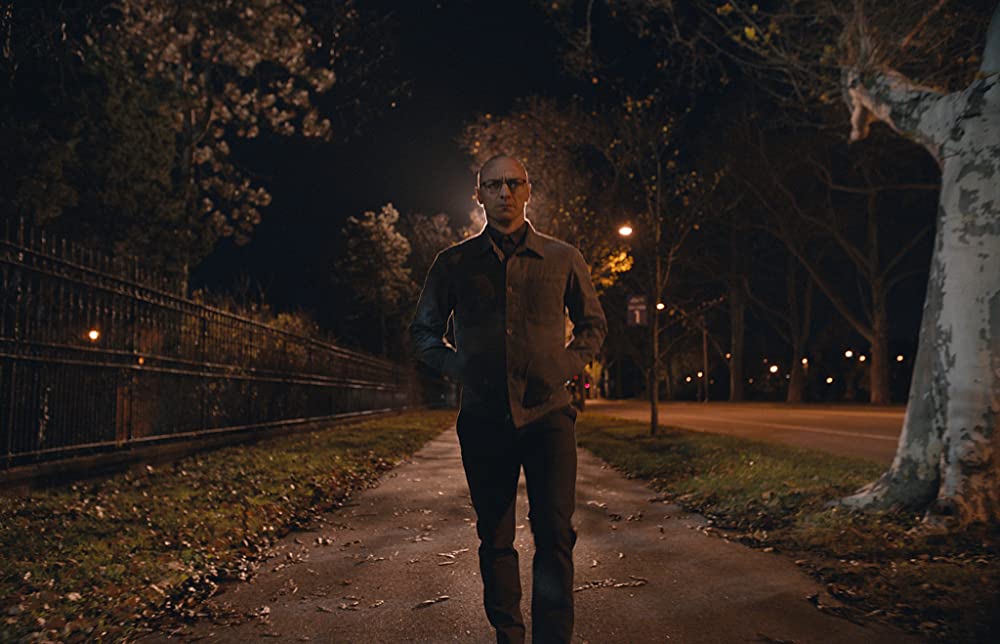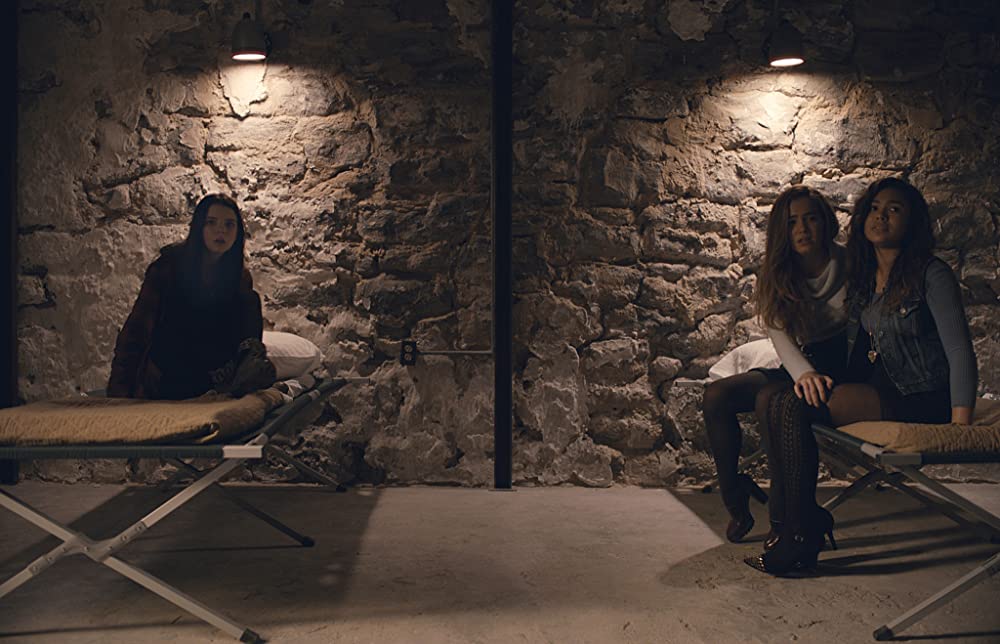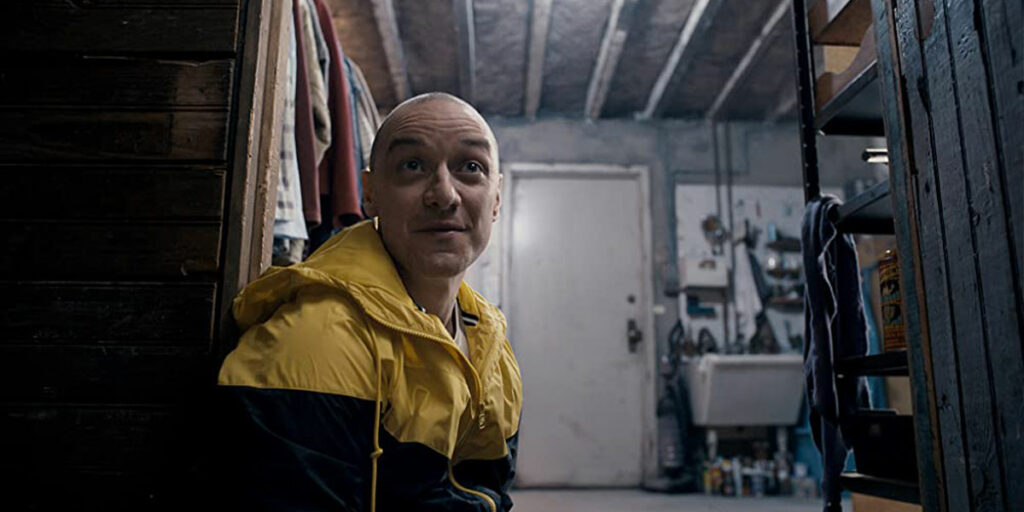Whether you view it as its own thriller or the secret sequel it is, Split excels and stands proudly as M. Night Shyamalan’s full return to form.
Brace yourself for a bold statement that no one’s ever said before: M. Night Shyamalan’s once-bright career took a hard fall from grace in the mid-2000s. But while the aftereffects of that fall can still be felt and even slip back into his films now and then (watch Old to see what I mean … no seriously, watch it, it’s hilarious), he’s mostly gotten back on track these days. And while The Visit was his first well-received film in years that began his comeback, the film that truly cemented his return to form is Split.
Casey (Anya Taylor-Joy) is a teenage girl who, along with two others, is abducted by Kevin Wendell Crumb (James McAvoy). Or rather, they’re abducted by Kevin’s 23 different personalities that are born from his dissociative identity disorder. As his psychologist Dr. Fletcher (Betty Buckley, aka the crazy lady from The Happening), examines him, Casey tries to make her escape before a mysterious ritual that will supposedly unlock a powerful 24th personality within Kevin.
There are two ways to look at Split: as a standalone, independent thriller, and as part of a larger story we didn’t even initially know about. Let’s start with it as its own thing first. This is one of the tensest, weirdest, and most unique thrillers to come out in the 2010s, which is amazing considering how easily it could have fallen apart. James McAvoy has a seemingly impossible task of playing 24 different personalities, convincing us all that they’re in the same body, and having them all come across as sincere and non-gimmicky, yet still darkly humorous. Hedwig, the personality of a nine-year-old, could have been very laughable in execution, but you’re laughing at him for all the right reasons. That is, when you’re not feeling a sickly mix of intimidation and sympathy for his age and naivete being exploited.

Kevin is especially amazing to watch when the possibility arises that some personalities are pretending to be other personalities, particularly when he’s around Fletcher (whose impressively sincere performance by Buckley is very overlooked). There’s actually enough nuance and little subtle clues just in McAvoy’s demeanor for you to really read into them and make legitimate guesses of which personality you’re watching. There are a few personalities that have essentially taken control of the rest to further their mysterious plan, and it’s so fascinatingly disturbing to observe such an intricate web of relationships and dynamics play out within a single person. Yes, it clearly doesn’t paint real-life D.I.D. in the most flattering light, but as a means of good character-building and storytelling, it’s too effective for me to not love.
Opposite McAvoy is Anya Taylor-Joy as Casey, who ends up being just as interesting … though not right away. One of my favorite parts of Split is how, little by little, it lets us into Casey’s past, how that’s shaped who she is now, and how it mixes with her dour present to potentially shape a new future. We get hints like being told Casey kept running away from home, to her seeming way more prepared and knowledgeable to deal with a monster like her captors than someone like her should, to flashbacks that show signs of something being off in her childhood that become clearer the more they play out.
Taylor-Joy centers all of that in a strong, scared, often subdued performance. Her character is constantly in the midst of her own mental balancing acts to survive and outwit her deranged captors. She’s the only character in the movie that can in any way stand toe-to-toe with Kevin’s personalities and make progress with them. This also speaks to both of them being, as one of the personalities says by the end, “broken,” in ways that turn out to be more similar than we would have initially thought. When the real Kevin himself finally shows up, their instant connection is heartbreaking as he desperately tries to reach out through a brief reprieve from his infinite darkness. It’s easily the most uncomfortable, bittersweet portion of the film.
Split is as welcome a return to form for Shyamalan visually as it is script-wise. This may be the best-looking film he’s ever done, and that’s saying a lot. From shot one, he has us feel Casey’s isolation from the other girls purely through his blocking and a slow dolly zoom. So many panning shots creepily reveal important details in a scene, and a lot of those details are setting up important events later. Small clues in the background hint to where we are, which in turn ends up being crucial to the final mysterious personality when it emerges. The location is dark and claustrophobic, and the tight camerawork, which Shyamalan sometimes misuses in other films, works perfectly to take advantage of that here.

All of this is to say, Split would be an amazing film that could stand on its own even if it ended one minute sooner than it did. But, of course, that final minute changed everyone’s perception of it with its big reveal: the movie takes place within the universe of Shyamalan’s grounded superhero film, Unbreakable. For many, this justifies the third act turn where the new personality ends up being an actual superpowered being, capable of super strength and wall-climbing. I personally was very much okay with this development already and found it a fitting, and refreshingly strange, culmination of what we know about these personalities.
But I won’t deny that such a concept works even better in a world that’s already established itself to have superpowers exist in a way that’s meant to mirror comic books. Split is, for lack of a better phrase, a comic book movie that’s not based on a comic book. But what I love the most is that it doesn’t feel that way, and it doesn’t need to state that upfront to hook viewers in (similarly to how Unbreakable wasn’t marketed as a superhero movie at first). This is technically a supervillain origin story, but its substance and craft go far outside that box. It transcends that genre as a much more grounded, sneaky way of showing why comic-book-like stories can be so effective.
And within the context of a three-film storyline, Split works excellently alongside Unbreakable and as a lead-in to the eventual sequel we got in Glass. Unbreakable is the birth of a hero who’s known no physical pain, and Split is the birth of a villain who’s known nothing but pain. Outside of their powers, they’re complete opposites, primed to be pitted against each other. And like in the Marvel Cinematic Universe, these “solo” films lay the groundwork for all our characters so their crossover can be as exciting as possible. I personally love Glass for how all of that plays out, including the ultimate conclusion to Kevin’s story and his relationship with Casey.
When I saw Split for the first time, I hadn’t even seen Unbreakable yet (meaning I was one of the few people who said, “Why’s Bruce Willis here all of a sudden?” at the end). Which shows that it doesn’t need the context of being a hidden sequel to be a great film. It’s just made even better with it. Whether I look at Split as a self-contained thriller, Part 2 of Shyamalan’s Unbreakable trilogy, or simply a return to form for a troubled director, I love it. It has one of the best performances of the decade in McAvoy’s work, its characters are richly developed and tragic, and it’s relentlessly uncomfortable and bleak while ending up being, in a really twisted way, somewhat inspiring.
Split is now available to watch on digital and on demand. Read our reviews of M.Night Shyamalan’s Knock at the Cabin, Old, The Sixth Sense, Signs, Glass, The Visit, and The Last Airbender.

